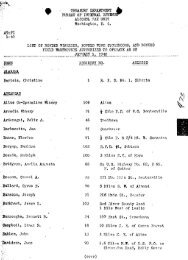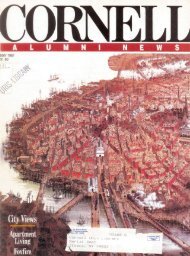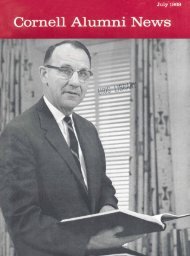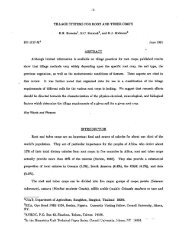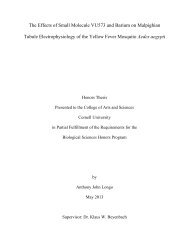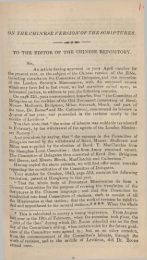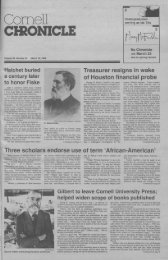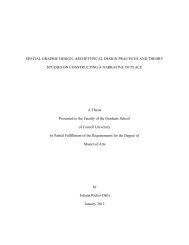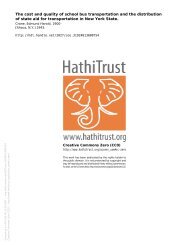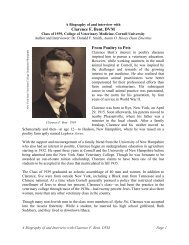Peru: you'll never see more species! - eCommons@Cornell - Cornell ...
Peru: you'll never see more species! - eCommons@Cornell - Cornell ...
Peru: you'll never see more species! - eCommons@Cornell - Cornell ...
You also want an ePaper? Increase the reach of your titles
YUMPU automatically turns print PDFs into web optimized ePapers that Google loves.
that he didn't cite enough Spanish material.<br />
"One reason I didn't use <strong>more</strong><br />
Spanish sources," he explains, "is because<br />
some of them are so critical of the<br />
United States that it would look as<br />
though I loaded the book. Maybe I<br />
should have put some of it in; maybe I<br />
made a mistake.<br />
"The other reason I didn't is because<br />
some of the best stuff—for example, on<br />
the impact of American policy on the<br />
Central American military—is in English."<br />
In general, says LaFeber, the book's<br />
detractors "tend to be people who were<br />
closely associated with John F. Kennedy<br />
or Jimmy Carter. I'm very harsh on<br />
Kennedy and Carter in the book, and<br />
these people read the book, don't like<br />
what I did to their heros, and so they<br />
don't like the book in general.<br />
"And that's understandable," he<br />
continues. "If I didn't want to get into<br />
that kind of thing, I would have written<br />
a book about one hour of the Battle of<br />
Gettysburg. When you get into a highly<br />
politicized, highly sensitive topic like<br />
this, you expect it. And I take a very<br />
strong, critical view of American<br />
policy."<br />
LaFeber says he arrived at his conclusions<br />
through his determination to read<br />
the information he found as objectively<br />
as possible, something he suggests is not<br />
always done, especially in Washington,<br />
DC.<br />
"The White House gets excellent information<br />
on what's going on in Central<br />
America," he says. "But it's also very<br />
clear that the White House has not paid<br />
a whole lot of attention to that information.<br />
They simply filter it out."<br />
After LaFeber finished work on his<br />
book, he decided to take a trip to Central<br />
America, "to <strong>see</strong> what I'd been writing<br />
about." As on a 1977 trip to Panama,<br />
Tom Holloway joined him. Holloway<br />
is fluent in Spanish; LaFeber is not,<br />
although he can, according to Holloway,<br />
read the language very well, and<br />
understand "a lot <strong>more</strong> than you might<br />
think for not having lived in a Spanishspeaking<br />
country."<br />
The two of them traveled to Costa<br />
Rica and Nicaragua—two countries<br />
about as different as could be, according<br />
to LaFeber. "Costa Rica is democratic,"<br />
he says. "Really democratic. It has<br />
a higher literacy rate than the United<br />
States." It also has, he discovered, a<br />
considerable community of <strong>Cornell</strong>ians.<br />
"Then you fly for about forty-five<br />
minutes," LaFeber notes, "and end up<br />
in Nicaragua. And there you are in the<br />
middle of the Sandinista revolution. In<br />
the middle of a city that was just devas-<br />
24 CORNELL ALUMNI NEWS<br />
Sheer volume<br />
of data puts<br />
a big premium<br />
on experience<br />
among historians<br />
tated by the '72 earthquake and <strong>never</strong> rebuilt."<br />
LaFeber and Holloway were able to<br />
<strong>see</strong> a little of the countryside during their<br />
Nicaraguan stay. LaFeber was struck by<br />
how great an American cultural and economic<br />
influence remains there, even as<br />
the country strives to break away from<br />
all things North American: "It's very<br />
strange," he says, "that the Nicaraguan<br />
national anthem—the revolutionary national<br />
anthem—condemns the United<br />
States, and then you look across the<br />
street and there they are playing baseball."<br />
LaFeber's visit confirmed his apprehension<br />
over what American policy has<br />
been doing to Nicaragua. "The United<br />
States is putting such tremendous military<br />
pressure on Nicaragua now that the<br />
Nicaraguans are going to get help from<br />
anywhere they can get it. So, in a real<br />
sense, Reagan's policy has pushed Nicaragua<br />
closer and closer to Cubans and<br />
Soviets. And I think that has to be understood."<br />
Regardless of the high profile his involvement<br />
in Central American issues<br />
has given him, Walter LaFeber remains<br />
nothing but what he has been now for<br />
<strong>more</strong> than twenty-five years, a dedicated<br />
historian. He rejects the thought that<br />
any one type of history might be <strong>more</strong><br />
"relevant" than another. "Any field in<br />
history or political science is important<br />
for what it tells us about the present, depending<br />
on the kinds of questions you<br />
ask of it.<br />
"All of us are historians in one way or<br />
another," he adds. "We all make decisions<br />
every hour of the day based on our<br />
view of history. That's not even a question.<br />
It's just whether or not you're conscious<br />
of it, and you do it on the basis of<br />
good or bad history, that's all."<br />
LaFeber acknowledges that the ability<br />
to make such historical judgments is not<br />
getting any easier. One reason is the advent<br />
of telecommunication. "Presidents<br />
like Washington, Lincoln, and the<br />
Adamses conducted a lot of their busi-<br />
ness in writing," he says. Starting with<br />
McKinley, however, presidents began to<br />
conduct their affairs by cable or by telephone.<br />
"It changes the nature of the research.<br />
You depend <strong>more</strong> and <strong>more</strong> on<br />
oral history, and that is a very dangerous<br />
kind of history."<br />
Another complication is sheer volume.<br />
"There was a great historian at<br />
<strong>Cornell</strong> named Carl Becker," LaFeber<br />
says, "and he and his generation believed,<br />
in the words of one of them, that<br />
written history was an act of faith. And<br />
to a certain extent it is. You can't totally<br />
recreate the past. Particularly when you<br />
get into 20th-century material, there is<br />
so much archival material, so much<br />
manuscript material, that you can research<br />
your subject forever."<br />
Ultimately, he says, "you've got to<br />
work out some kind of basis for selection<br />
and be able to defend that. That's<br />
the nature of history, whether you're<br />
writing about the medieval period, or<br />
about US policy in the 1980s. You cannot<br />
totally recreate the past. You've got<br />
to do it on the basis of selected evidence,<br />
and particular kinds of approaches, and<br />
then be ready to defend it.<br />
"Many years ago," adds LaFeber,<br />
"the American Historical Association<br />
heard all this business about how either<br />
mathematicians or physicists do their<br />
best work before the age of 30, or something<br />
like this—their most innovative<br />
work. So they took a poll of the profession<br />
to find out when historians do their<br />
important work, or their most innovative<br />
work. The average age was 49.<br />
"And I think that's the nature of the<br />
profession," says LaFeber, who turns 51<br />
in August. "It usually takes you that<br />
long to figure out what's important, and<br />
how you handle evidence, and how you<br />
can do it honestly and creatively. It takes<br />
you an awful long time to do that."<br />
More than fifteen years ago, LaFeber<br />
himself wrote for the Alumni News an<br />
article discussing the work of the revisionist<br />
historians. His conclusion is<br />
worth restating. For just as Walter La-<br />
Feber has risen to become, in Joel Silbey's<br />
words, "a very, very important<br />
historian—a leader in the revisionist<br />
school of history," so do his words from<br />
1968 acquire renewed meaning when reflected<br />
onto his own exceptional career.<br />
"[W]hatever else the revisionists accomplish,"<br />
he wrote, "perhaps their<br />
greatest contribution will be a reaffirmation<br />
of the faith that the study of history<br />
is the necessary means through which<br />
the promise of the past can be transformed<br />
into fulfilment." Luckily we<br />
have people like Walter LaFeber to remind<br />
us of the promise of the past.



